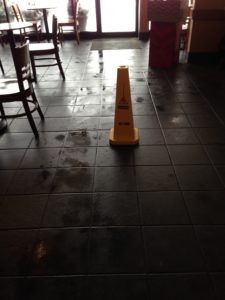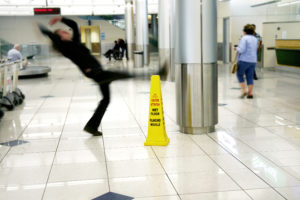 Do You Have an Injury from Slipping And Falling on a Wet Floor?
Do You Have an Injury from Slipping And Falling on a Wet Floor?
A wet floor is an inherently dangerous condition. It can cause an individual to slip and fall, stumble, or fall on the ground. Often there are injuries as a result.
The dangers associated with a wet floor seem obvious. However, the condition often goes unattended or ignored by a property owner or manager. This enables members of the public to come into contact with these dangerous situations, and possibly causing severe injuries to the victim.
In fact, our cultural media, like tv shows and movies, often show slip and falls as funny. But oftentimes, they are anything but. Slip and fall victims can be seriously injured as their legs go out from under them and they land on their head, neck, or back. As you can imagine, a slippery floor in a grocery store is no place to hit your head after falling from a height of 5ft or so.
Under the laws of Chicago and of the state of Illinois, property owners have a duty to keep their businesses safe for customers. This extends to owners of residential properties as well, including apartment buildings and condominium complexes. This means that a landlord must take steps to prevent wet floors from occurring and to fix the situation should it arise. Failing to do so may make a landlord liable for any injuries that result to a patron who slips and falls on a wet, dangerous floor.
What are 8 Quick Facts about Slip and Falls?
- Slip and fall accidents require more than a million people to go to the ER each year.
- The average cost of a slip and fall caused by snow or ice is $33,000 to $48,000.
- Each year, one-third of all elderly adults in the US will slip and fall.
- Slip and falls are one of the most common reasons that people are injured each year.
- Slip and falls are also the leading cause of a traumatic brain injury, or TBI.
- The medical bills that are created by slip and fall injuries cost Americans more than $34 billion a year.
What Action Must a Business Take to Prevent Falls on Wet Floors?

The standards applied to a business to prevent slip and falls may vary depending on the:
- Nature of the business
- Location of the business
- Type of consumer served by the business
But all businesses are required to address slippery or wet floors and to rectify the hazard when they occur or when someone notices the situation.
Slippery and Wet Floors at the Grocery Store
A supermarket or grocery store is a type of establishment that experiences a high number of slip and falls. Many of these accidents are due to wet or slippery floors. Regular cleaning of flooring surfaces can present a danger to customers and wet floor signs should always be used by supermarket staff.
Additionally, spilled products on the floor of grocery aisles can cause a busy shopper to stumble and fall. Spilled liquid products can be the most dangerous, like milk and juice, but other types of food are also hazardous.
In fact, many slip and falls occur in the produce section. Produce may fall to the ground and shoppers may step upon the fallen produce, smashing it and letting a slippery surface develop. If the store does not clean up a spill within a reasonable amount of time, it can cause shoppers to slip and fall.
Leaking Refrigerators, Freezers, Sinks, Toilets and Roofs
Failure to maintain equipment has also led to numerous wet and slippery floors in businesses. A refrigerator or freezer that does not properly function may leak water which can spread to nearby areas of the floor. Similarly, leaky faucets or toilets in a restroom can create pooling water that may lead to injury. Or even a leaking roof can cause a wet and slippery floor hazard.
How To Prevent Wet Floor Injuries?
After a fall on a wet floor, a building owner or manager may attempt to blame the victim for the incident. But, in many cases it is not the victim's fault. It is the responsibility of the building's owner to maintain a safe environment.
The ideal safety procedures may vary depending on the type of surface involved or the type of business for which the procedures will be used. However, it may include:
- The use of a non-slip surface
- The addition of non-slip treading or tape to flooring already in use
- Mats or carpeting in high traffic areas
- Floor drains in areas known for water accumulation
- Constant monitoring of the floor's condition for water issues
- Proper repair and maintenance of electrical equipment
- Establishing proper procedures and protocols to deal with spills
- The use of wet floor signs whenever water is present or may present itself in an area
In some cases, the design of a building or of a specific floor is hazardous no matter what. It can lead to injuries regardless of the actions of the building's owner. If an improper design of a floor leads to injury, it may still be the fault of the owner, builder, or designer of the floor. A victim still may be able to recover.
Should You Contact an Experienced Wet Floor Accident and Injury Attorney in Chicago?
If you have been injured by a slip-and-fall on a wet or slippery floor, you may be entitled to financial relief for your damages. In many cases, this can include payment for your medical bills, lost wages, and any pain and suffering you endured. After an accident, you should consider speaking with a slip & fall lawyer in Chicago to learn about your legal rights and whether you may have a valid legal claim.
The lawyers at Abels & Annes, P.C. only represent accident victims. We believe in the rights of victims to obtain adequate financial compensation for their losses. We fight for our clients daily and we offer a free case consultation to all accident victims. Call us at (312) 924-7575 or (855) LAW-CHICAGO (529-2442). If you have been a victim of a wet floor accident, do not continue to suffer without relief. Call us and let us help you today.
If you have been hurt after falling on a wet floor, call us today at (855) LAW-CHICAGO or Contact Us online for a free case consultation.